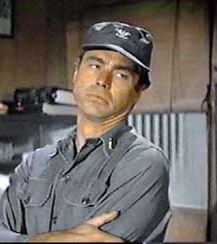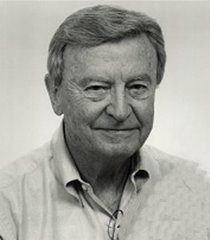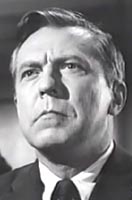
Robert Towne is an American screenwriter, producer, director and actor. He started with writing films for Roger Corman including The Tomb of Ligeia (1964). Later, he became a well-known figure of the New Hollywood wave of filmmaking. He is best known for his Academy Award-winning original screenplay for Roman Polanski's Chinatown (1974), which is widely considered one of the greatest screenplays. Towne also wrote the sequel, The Two Jakes (1990); the Hal Ashby comedy-dramas The Last Detail (1973) and Shampoo (1975). He is also known for his collaborations with Tom Cruise on the films Days of Thunder (1990), The Firm (1993) and the first two installments of Mission: Impossible franchise.

M*A*S*H is an American war comedy drama television series that aired on CBS from September 17, 1972 to February 28, 1983. It was developed by Larry Gelbart as the first original spin-off series adapted from the 1970 feature film M*A*S*H, which, in turn, was based on Richard Hooker's 1968 novel MASH: A Novel About Three Army Doctors. The series, which was produced with 20th Century Fox Television for CBS, follows a team of doctors and support staff stationed at the "4077th Mobile Army Surgical Hospital" in Uijeongbu, South Korea, during the Korean War (1950–53).

Lloyd Vernet Bridges Jr. was an American film, stage and television actor who starred in a number of television series and appeared in more than 150 feature films. He was the father of four children, including the actors Beau Bridges and Jeff Bridges. He started his career as a contract performer for Columbia Pictures, appearing in films such as Sahara (1943), A Walk in the Sun (1945), Little Big Horn (1951) and High Noon (1952). On television, he starred in Sea Hunt 1958 to 1961. By the end of his career, he had re-invented himself and demonstrated a comedic talent in such parody films as Airplane! (1980), Hot Shots! (1991), and Jane Austen's Mafia! (1998). Among other honors, Bridges was a two-time Emmy Award nominee. He received a star on the Hollywood Walk of Fame on February 1, 1994.

Edward Dean Winter was an American actor. He is best known for his recurring role, Colonel Samuel Flagg, in the television series M*A*S*H from 1973 to 1979.

John Winfield Stephenson was an American actor, most active in voice-over roles. He has also been credited as John Stevenson. Stephenson never gave any interviews and was rarely seen in public, although he did make an appearance at BotCon 2001.

Philip H. Lathrop, A.S.C. was an American cinematographer noted for his skills with wide screen technology and detailed approach to lighting and camera placement. He spent most of his life in movie studios. Lathrop was known for such films as Touch of Evil (1958), Lonely Are the Brave (1962), The Americanization of Emily (1964), The Cincinnati Kid (1965), Point Blank (1967), Finian's Rainbow (1968), The Traveling Executioner (1970), Portnoy's Complaint (1972), Earthquake (1974), Swashbuckler (1976), The Driver (1978), Moment by Moment (1978), A Change of Seasons (1980), Foolin' Around (1980), Loving Couples (1980), and Deadly Friend (1986).

Howard Jerome Morris was an American actor, comedian, and director. He was best known for his role in The Andy Griffith Show as Ernest T. Bass, and as "Uncle Goopy" in a celebrated comedy sketch on Sid Caesar's Your Show of Shows (1954). He also did some voices for television shows such as The Flintstones (1962–1965), The Jetsons (1962–1987), The Atom Ant Show (1965–1966), and Garfield and Friends (1988–1994).

Anton Diffring was a German-born character actor who had an extensive career in the United Kingdom from the 1940s to the 1980s, latterly appearing in international films. He appeared in over 50 features and was typically cast as a Nazi officer.

Secret Army is a British television drama made by the BBC and the Belgian national broadcaster BRT created by Gerard Glaister. It tells the story of a fictional Belgian resistance movement in German-occupied Belgium during the Second World War dedicated to returning Allied airmen, usually having been shot down by the Luftwaffe, to Great Britain. It was made in the UK and Belgium and three series were broadcast on BBC1 between 7 September 1977 and 15 December 1979.
Francis Bernard Heptonstall better known by the stage name Bernard Hepton, was an English theatre director and actor. He is known for his stage work and television roles in teleplays and series, he also appeared briefly on radio and in film.
John Clifford Rose was a British actor.
James Earl Gilstrap is an American singer, considered one of the most prolific session musicians in the industry. He is best known for his 1975 solo hit single "Swing Your Daddy", as well as singing co-lead to the theme from the TV series Good Times.
David de Keyser was an English actor and narrator.

Kessler is a television series produced by the BBC in 1981, starring Clifford Rose in the title role. The six-part serial is a sequel to the Second World War drama series Secret Army, set in contemporary times.
Brian Horace Clemens was an English screenwriter and television producer, who worked on The Avengers and The Professionals. Clemens claimed to be related to Mark Twain, a fact reflected in the naming of his two sons, Samuel Joshua Twain Clemens and George Langhorne Clemens.

Herbert Birchell "Bert" Remsen was an American actor and casting director. He appeared in numerous films and television series.

Peter Hobbs was a French-born American character actor, known for roles on Broadway, television and film.

Ralph Manza was an American character actor who made over 160 appearances in American film and television shows.
Leonard Kessler was an American children’s book author.












